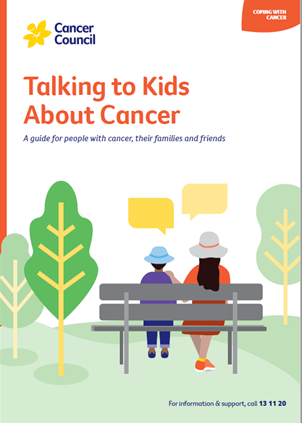- Home
- About Cancer
- Family and friends
- Talking to kids about cancer
- Talking about treatment
- Family life during treatment
- Spending one-on-one time
Spending one-on-one time
When a family member is diagnosed with cancer, it can be difficult for parents to spend one-on-one time with their children. One way to focus your attention and care is to schedule a weekly 30-minute session with your child or teenager. This may help them feel important, valued and understood.
Talk with your children about the type of activities and family time that are important to them. If you have more than one child, you may need to alternate weeks for one-on-one time depending on your energy levels.
How play sessions can help with younger children
A younger child may not have developed the thinking or language skills to describe how they’re feeling, but a play session can help the child to express feelings, make sense of events, and understand the world. They may:
- act out a story with toys or puppets
- use fantasy and dress-up
- draw, paint or play games
- talk about their experience.
Ways to play
During a play session, comment on what they’re doing using empathy or observation, which will let them know that you are interested in what they are doing, saying and feeling. They may play on their own or invite you to play with them.
Avoid asking questions or correcting your child. This time is for them to lead the way. Their play may reveal an inner world that you may never have known about from what they say.
It’s common for teenagers to prefer spending more time with friends, but they may like to visit a favourite cafe, go for a walk, watch a movie or listen to music with you.
Family time
“I tried to get some rest during the day so that I was bright and more energetic when the family came home from school and work in the evening. I didn’t want them to feel they had a sick mum all the time – I was only sick from the treatment, not from the disease itself.
It was important to spend time together as a family. Special times together often opened up questions for the kids.
Talking is not the only way of communicating about feelings – in fact, it often goes over the head of a young child. When my kids were younger, it worked better to use dolls or stuffed animals to play out being sick, having treatment and getting well again.”
LIZ, MOTHER OF THREE CHILDREN AGED 10, 16 AND 18
→ READ MORE: Maintaining discipline
Podcast: Family Dynamics and Cancer
Listen to more episodes from our podcast for people affected by cancer
More resources
Prof Jane Turner AM, International Psycho-Oncology Society President Emeritus,The University of Queensland, QLD; Taylor Baker, Consumer; Dr Ben Britton, Principal Clinical and Health Psychologist, Head of Psychology, Hunter New England Mental Health, NSW; Camp Quality; Dr Lisa Cuddeford, Head of Department, WA Paediatric Palliative Care Service, Perth Children’s Hospital, WA; A/Prof Peter Downie, Head, Paediatric Haematology–Oncology and Director, Children’s Cancer Centre, Monash Children’s Hospital, VIC; Dr Sarah Ellis, Clinical Psychologist, Kids Cancer Centre, Sydney Children’s Hospital, NSW; Malia Emberson-Lafoa’i, Consumer; Kate Fernandez, 13 11 20 Consultant, Cancer Council SA; Jane Gillard, Consumer; Mary McGowan OAM, International Childhood Cancer Advocate, VIC; Annette Polizois, Senior Social Worker, Women, Family and Emergency Care Team, Royal North Shore Hospital, NSW; Rhondda Rytmeister, Clinical Psychologist, HeadWayHealth (formerly Snr Clinical Psychologist, The Cancer Centre for Children, Westmead, NSW); Nadine Street, Head of Social Work and Social Welfare, HNE Mental Health Service, NSW; Warren Summers, Online Counsellor, Canteen, NSW.
We would also like to thank the health professionals, consumers, organisations and editorial teams who have worked on previous editions of this title, and we are grateful to the parents and young people whose real-life stories have added to the richness and relevance of this book.
We thank and acknowledge Dr Paula K. Rauch, MD, Founder and Director, Marjorie E. Korff PACT (Parenting At a Challenging Time) Program and Associate Professor of Psychiatry, Harvard Medical School, whose research and writing on helping parents talk to their children about cancer was used as source material for this book and has been adapted in several sections: pages 8–11, How children understand cancer; page 22, Answering key questions: Are you going to die?; page 26, Involving the school or preschool; pages 30–31, Hospital visits; and pages 36–37, Encouraging family time. We also thank the American Cancer Society for permission to use and adapt material on pages 8-11 from its book Cancer in Our Family: Helping children cope with a parent’s illness (2013); Macmillan Cancer Support for permission to use its book Talking to Children and Teenagers When an Adult Has Cancer (2013) as a source of information; Jessica Watt, Oncology Social Worker, The Children’s Hospital at Westmead, for her contribution on page 20, When another child has cancer; and Diane McGeachy, Hobart Counselling Centre, for contributing material for page 37, Spending one-on-one time.
View the Cancer Council NSW editorial policy.
View all publications or call 13 11 20 for free printed copies.

